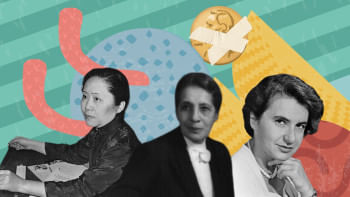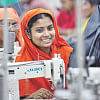Are we backtracking on our commitment to gender equality?

Last week, the dismembered body of 36-year-old RMG worker Shantana Begum was recovered from a nursery in Savar. Her severed head and hands were found in a plastic bag in a nearby kindergarten. Police suspect that she was killed by her husband following a "family feud."
It would be easy enough to dismiss this sensational crime as an isolated incident. The reality, however, is that violence against women is insidious, and for the most part, invisible—until and unless it involves a dismembered or brutally bruised body. At least 72.6 percent of ever-married women in the country have experienced some form of violence at the hands of their partners, over 90 percent have been harassed while using public transportation and 64 percent of women have been abused in the digital sphere. We have cited these statistics so many times it seems blasé, almost, to bring them up. Such everyday acts of violence—which are compounded depending on a woman's social location—do not merit our collective outrage any more than the structural inequalities that continue to constrain women's equal participation in the social, political and economic spheres, despite the grandiloquent promises of equality enshrined in our constitution and all subsequent policy documents.
Since those tumultuous days of July, we have weaved many dreams, held countless talks on state and institutional reforms, and engaged in riotous debates about the country's future. As panel after panel has mansplained what kind of country we want, it has become painfully obvious that for the vast majority of women, freedom will remain a far cry—at least for the foreseeable future. Women, who were at the forefront during the uprising, have since receded into the background, and of the 50 members in the six reform commissions formed so far, only five are women and none from any religious, ethnic, or other minority communities. Although we were excited to hear about the formation of a Women's Affairs Reform Commission, the commission is apparently yet to receive its terms of reference and finalise its list of members.
Meanwhile, there has been a disturbing resurgence of moral policing of women and violence against them both on the streets and in cyberspace, with deliberate and often organised attempts to silence those daring to take up too much space. If we are to pay any attention to the clamour of hate online, it would appear that a large number of men in this country actually think women have been given too much freedom over the past few decades and need to be put in their rightful place—i.e. fulfilling their familial duties without complaints or compensation, and subservient to the wishes of their male counterparts and comrades. There are genuine concerns among many women's rights activists about the likelihood of majoritarian backlash against feminist organising in the days to come, as we have seen in many other countries in the world, including the United States. And true to form, we are already seeing targeted campaigns against Indigenous communities, gender-diverse populations, their allies, and even female protesters who were hailed as "queens" during the uprising.
Under the circumstances, the interim government needs to quickly set an agenda that reaffirms its commitment to upholding women's rights. It also needs to take stock of the progress that has been made in reality, rather than just on paper. The Hasina regime categorically touted gender equality as a cornerstone of its development paradigm, enacting numerous gender-sensitive laws, policies and strategies over the years. It also introduced gender budgeting in 2009, allocating 34.11 percent of the total budget to this end in FY 2024-25. The decade through 2010 to 2020 did see improvements in various indicators—as per government data—including greater gender parity in school enrollment at the primary and secondary levels, maternal and child health, and increased participation of women in the economy. As a result, the country consistently ranked first among South Asian countries in terms of gender parity, according to the Global Gender Gap report by the World Economic Forum (WFP).
However, beyond these feel-good statistics and loft promises in policy documents lie a grimmer reality—of entrenched patriarchal norms, erasure of women's economic and social contributions, insidious violence, unequal access to resources and wages, and unresponsive and insensitive state institutions. The plethora of laws enacted during the last regime had one thing in common—lack of implementation and follow-up by relevant authorities—resulting in unsafe homes, workplaces and public spaces for women and girls, with an alarming conviction rate of 3 percent in VAW cases. We saw perpetrators get away with unimaginable violences and exploitations exercising their access to wealth and political power, making a mockery of the legal system that is supposed to protect the most vulnerable in society.
Despite having a female head of state, as well as a female speaker in the parliament, for over a decade, the political sphere continued to be dominated by men, with women from reserved seats at the national as well as local government levels relegated, for the most part, to ornamental roles, devoid of resources and decision-making power. The promises in Awami League's election manifesto to hold direct elections for 100 reserved seats for women, or to increase women's representation in parliament to 33 percent as per the National Women Development Policy 2011 were never actually realised. The Representation of the People Order, 1972, had mandated that all political parties must ensure at least 33 percent of all committee positions for women, including in the central committee, by 2020 in order to get registered, but the Election Commission took no steps to bring any of the political parities to line over the past four years.
The AL's boasted the loudest of women's economic empowerment, pointing to the rising participation of women in the workforce, particularly in the RMG sector. Although female labour-force participation increased to 42.68 percent in 2022 from 36.3 percent in 2016/17, it is still roughly half of the male participation, which stood at 80.5 percent, according to the Quarterly Labour Force Survey provisional report 2022. An overwhelming 95 percent of them continue to be employed in highly precarious jobs in the informal sector, denied basic rights such as overtime, maternity leave, pension and other benefits. The pandemic, following by the worst cost-of-living-crisis as well as frequent climate events, have pushed women into further poverty, as wages have remained stagnant and jobs have been cut. According to the Global Gender Gap 2024, income inequality between men and women has increased nearly five times since 2018—the deterioration is so significant that Bangladesh lost 40 ranks on the index as a result. Meanwhile, a staggering 61.71 percent of young women and girls are not in employment, education or training (NEET), compared to 18.59 percent for men.
Women's land ownership may have increased over the past decade, but even then, only 12 percent of rural women own agricultural land solely or jointly, and 7 percent own non-agricultural land, according to research by the World Bank. Only 1.7 percent of formal enterprises are owned by women. Although the Bangladesh Constitution guarantees equal rights to men and women, there is as yet to uniform personal law regulating family and personal issues, such as the right to inheritance and property. For 40 years, Bangladesh has upheld its resverations on Articles 2 and 16.1(c) of the UN Convention on Elimination of All Forms of Discrimination Against Women (CEDAW), citing conflicts with religious laws. The Law Commission, which was tasked with studying examples of other Muslim countries, recommended that the government withdraw the aforementioned CEDAW articles, but no steps were taken to do so. Rather, in the NWDP, it was added that anything contrary to the Holy Quran and Sunnah will be void, even though the country is not governed by Shariah laws.
The list of unfulfilled promises, unfortunately, are never-ending. Last week, the Ministry of Women and Children Affairs along with UN Women, hosted an exchange session with civil society and women's rights organisations in Bangladesh, to assess progress, existing and emerging challenges and priority actions for accelerating gender equality and the empowerment of girls, ahead of the 30th anniversary of the historic Beijing Declaration and Platform for Action (BDPfA). During the discussion, the advisor for MoWCA asked for concrete recommendations that the interim government can implement within the next one year. Among the recommendations highlighted by activists, academics and development partners were: withdrawing the reservations on the Convention on the Elimination of All Forms of Discrimination Against Women (CEDAW), finalising the Sexual Harassment Act, amending the Domestic Violence Act, ensuring digital safety of women and girls, introducing comprehensive sexuality education at schools to address gender stereotypes and discriminatory social norms, and creating robust annual monitoring mechanisms to ensure accountability in the implementation of commitments on gender equality.
But we know only too well that recommendations in Bangladesh, like laws, fall by the wayside. We hope that the interim government takes this opportunity to engage with key stakeholders, including the youth and women and girls from the grassroots, as it charts out a bold and practical agenda that can put gender equality back on track, rather than backtrack on commitments made over the decades.
Sushmita S Preetha is the op-ed editor at The Daily Star.
Views expressed in this article are the author's own.
Follow The Daily Star Opinion on Facebook for the latest opinions, commentaries and analyses by experts and professionals. To contribute your article or letter to The Daily Star Opinion, see our guidelines for submission.

 For all latest news, follow The Daily Star's Google News channel.
For all latest news, follow The Daily Star's Google News channel. 











Comments